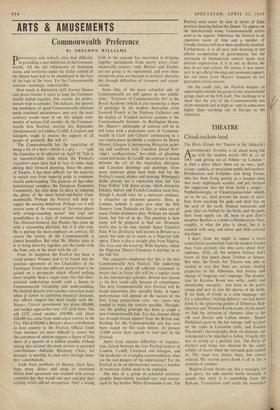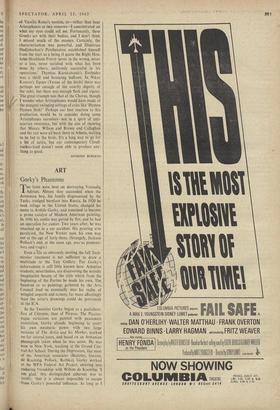THEATRE Cloud-cuckoo-land
The Birds. (Greek Art Theatre at the Aldwych.) AISTOPHANES' Ornithes is all about being fed up with the modern world-414 ac or AD 1965—and getting out of Athens—or London— to find a place where there are no wars, poli-
ticians, vandals, or wearisome public bell-wethers. Peisthetairos and Evelpides visit King Tereus, who has been living quietly as a hoopoe since that nasty nightingale scandal, and put forward ,G the suggestion that the birds build a utopia--4 Nephelococcygia or Cloud-cuckoo-land—which, :( set in the air, shall prevent the steam of sacri- fices from reaching the gods and shall live on the seed of the earth. Human emissaries and gods alike are bullied by the birds, and the gods, their food supply cut off, have to give Zeus's daughter Basileia as a bride to Peisthetairos. That, roughly, is what the play is about, but it is studded with song and dance and little satirical interludes.
I don't think we ought to expect a more authoritative production from the modern Greeks than from anybody else who cares about Aris- tophanes. After all, the modern Italians don't know all that much about Terence or Seneca. But what the Greek Art Theatre was able to remind us was that there are certain abiding properties in the Athenians that history and change of language can't expunge. The produc- tion by Karolos Koun was witty, sunlit and abominably energetic : you have to be pretty young and spry to join the chorus of the birds. If we think of Greek as a slow language—apt , for a schoolboy's halting delivery—we had better listen to the sputtering gunfire of Dimitrios Had- jimarkos and Thymios Karakatsanis. In the music we find the intrusion of elements alien to the old cool Dorian and Lydian modes: Manos Hadjidakis gave us the hot twangy stuff we hear on the radio in Levantine cafés, and Zouzou Nikoloudi's choreography drew on elements too syncopated to be regarded as folksy. Visually this was as strong as a garlicky kiss. The flurry of feathers and wings was checked by the comic solidity of masks when the outraged gods stalked in. The stage was always busy, but always ordered. My starved pores drank it all in like a promise of summer.
Modern Greek throws up, like• a nostalgia for past glory, the odd ancient word; normally it sounds like what it is—something from the Balkans. Translations can't catch the word-plaY of Vassilis Rotas's version, so—rather than hear Aristophanes at two removes—I concentrated on what my eyes could tell me. Fortunately, these Greeks act with their bodies, and I don't think I missed much of the essence. Certainly, the characterisation was powerful, and Dimitrios Hadjimarkos's Peisthetairos established himself from the start as a being (I quote the Right Hon. John Hookham Frere) 'never in the wrong, never at a loss, never satisfied with what has been done by others, uniformly successful in his operations.' Thymios Karakatsanis's Evelpides was a shrill and bouncing buffoon. In Nikos Kouros's Epops (Tereus of the birds) there was perhaps not enough of the courtly dignity of the ruler, but there was enough flesh and vigour. The great triumph was that of the Chorus, though I wonder what Aristophanes would have made of the pungent swinging settings of cries like 'Hymen Hymen Hoh!' Perhaps our best reaction to this production would be to consider doing some Aristophanes ourselves—not in a spirit of anti- quarian reverence, but with the aim of showing that Messrs. Wilson and Brown and Callaghan and the rest were all back there in Athens, waiting to be fed to the birds. It's a long way to go for a bit of satire, but our contemporary Cloud- cuckoo-land doesn't seem able to produce any- thing as good.
ANTHONY BURGESS































 Previous page
Previous page